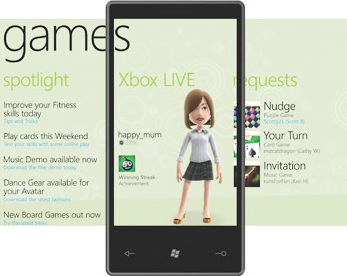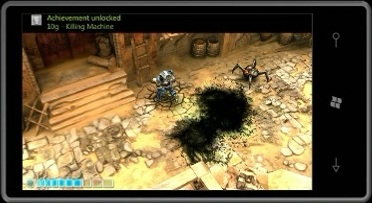Windows Phone 7 Gaming: What We Know So Far
By Jared Newman | Thursday, August 12, 2010 at 10:14 pm
 At a presentation for developers in March, Microsoft showed a single Xbox Live game running on three different platforms. First came the PC, then Windows Phone 7, and finally the Xbox 360, each one picking up where the last left off. Developing games for all three would be a breeze, Microsoft promised, and it seemed that by connecting the three screens, the company’s gaming strategy would go where the competition hadn’t.
At a presentation for developers in March, Microsoft showed a single Xbox Live game running on three different platforms. First came the PC, then Windows Phone 7, and finally the Xbox 360, each one picking up where the last left off. Developing games for all three would be a breeze, Microsoft promised, and it seemed that by connecting the three screens, the company’s gaming strategy would go where the competition hadn’t.
Five months later, Windows Phone 7 gaming is still somewhat of a mystery. Microsoft has missed a couple opportunities to show that Windows Phone 7 is a serious gaming platform. The phone was mostly absent from E3, a major video game industry trade show, and when several publications tested Windows Phone 7 prototypes in July, the Xbox Live section was an empty shell, with no actual games to speak of.
Microsoft still has until the holiday season to impress gamers with Windows Phone 7, but there are a lot of blanks to be filled in. For now, I’ve learned enough to paint a blurry picture of what Windows Phone 7 gaming will be like.
Windows Phone 7 games will be divided into the “Xbox Live Marketplace,” which will be curated by Microsoft, and the “Windows Phone Marketplace,” a free-wheeling library similar to the iPhone App Store. Only the games in the former marketplace will be able to tap Xbox Live features, such as Achievements and compatibility with the PC and Xbox 360. This divide was first revealed in April and confirmed to me by Michael Klucher, Program Manager Lead on Microsoft’s XNA Game Studio Team.
As for existing Xbox Live Arcade games, the vast majority of them will not be playable on Windows Phone 7. The reason is partly technological — the Xbox 360 has a lot more power than a phone, and games haven’t necessarily been developed with weaker processors in mind — but more importantly, most Xbox Live Arcade games use a different programming method than the one required by Windows Phone 7. Xbox Live Arcade games are predominantly coded in C++ with the Xbox Development Kit, while Windows Phone 7 will use Silverlight and the XNA framework. Bottom line: To play Braid or Pac-Man Championship Edition on Windows Phone 7, it’ll have to be re-programmed.
Not all Xbox Live Arcade games were created in C++ — Chime and Lucidity are notable exceptions — but as Chime Producer Brynley Gibson explained to me, the drawback to XNA is its one-size-fits-all approach. Pardon the jargon, but XNA is “managed code,” which is better for creating fast prototypes and developing quickly, but it’s ultimately more restrictive than C++. Most Xbox Live Arcade developers choose the latter language because it lets them bring their own engines and development tools, Gibson explained. With XNA, developers are stuck with whatever tools Microsoft allows in exchange for faster creation with fewer resources.
 Going forward, the question is whether Xbox Live Arcade developers will choose XNA, and its lure of cross-platform gaming, or stick with the language that gives them more flexibility but shackles them to the Xbox 360. I imagine the answer is “both.” Microsoft is reportedly launching a studio for mobile development, referred to in a job posting as “MGS Mobile Gaming,” so at least in theory, Microsoft will have a healthy lineup of Xbox Live Marketplace games at launch for Windows Phone 7. But Xbox Live Arcade games are successful enough on their own that I doubt we’ll see developers flock to a different programming method.
Going forward, the question is whether Xbox Live Arcade developers will choose XNA, and its lure of cross-platform gaming, or stick with the language that gives them more flexibility but shackles them to the Xbox 360. I imagine the answer is “both.” Microsoft is reportedly launching a studio for mobile development, referred to in a job posting as “MGS Mobile Gaming,” so at least in theory, Microsoft will have a healthy lineup of Xbox Live Marketplace games at launch for Windows Phone 7. But Xbox Live Arcade games are successful enough on their own that I doubt we’ll see developers flock to a different programming method.
What about Xbox Live Indie Games, the small-scale Xbox 360 games market Microsoft launched in late 2008? All those games, which are peer-reviewed but not managed by Microsoft, are developed with XNA. That makes them prime candidates for porting to Windows Phone 7, but the majority will have to live in the Windows Phone Marketplace, with no console connectivity. Just as a very limited number of Xbox Live Indie Games graduate to Xbox Live Arcade, only select indie developers will get to release Windows Phone 7 games with achievements and cross-platform compatibility.
The questions I still have about Windows Phone 7 gaming are more basic: What kinds of games will dominate Microsoft’s curated Xbox Live Marketplace? Will there be a matchmaking system for multiplayer gaming? Will cross-compatibility cost extra, as it does with Microsoft Game Room? Will Microsoft come out of the gate with some of its exclusive franchises, such as Halo and Mass Effect? Will we see mobile games that, when played, affect events in retail, disc-based games? Is there a broader plan to take MGS Mobile games to other platforms besides Microsoft’s three screens?
Shortly after E3, Techland’s Peter Ha reported that Microsoft will reveal more about Windows Phone 7 during Gamescom, a conference scheduled for next week in Germany. Let’s see if Microsoft can muster more than a whisper about Windows Phone 7 gaming this time around.
3 Comments
Read more:













August 14th, 2010 at 8:41 pm
The device is plenty fast. The processor is at least 1ghz and the device also includes graphics co-processor w/DirectX. Some devices will have even faster processors. The screen requirements are capacitive touch with a minimum of 4 point multi-touch. Stay tuned for some really cool stuff at launch.
December 24th, 2010 at 9:01 pm
This maybe hypothetically an iPhone killer but that's just speculation till i see and compare it with the iPhone.
January 26th, 2012 at 11:53 am
The device is plenty fast. The processor is at least 1ghz and the device also includes graphics co-processor w/DirectX. Some devices will have even faster processors. The screen requirements are capacitive touch with a minimum of 4 point multi-touch. Stay tuned for some really cool stuff at launch.